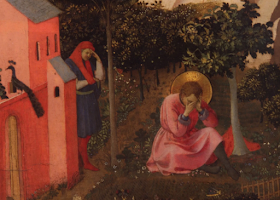“God Became Small: Preaching Advent,” which reflects on the season and also has a load of illustrative material that might fit in any of the four Sundays.
Isaiah
2:1-5. What is God’s coming about? Isaiah eloquently invites us to expect something
broader than just me as an individual. It’s international, cosmic in scope.
Preaching Advent is brief, and hopefully surprising, drawing people out into
something beyond the narrowness of the year and the strictures of shopping and
decorating. Perhaps reflecting on what we’re seeing through the James Webb
telescope, which people seem fond of, is a way to draw people into greater awe
and unfathomable expectation.
Isaiah envisions (or God showed him!) a day
when God’s purposes will be consummated. God’s seemingly little hill, Mt. Zion
(hardly the highest!) will be the highest, nations will stream into it, all
will learn and walk in God’s ways, and weapons will be reforged into implements
of life and goodness. Why go to Mt. Zion/Jerusalem? Not to sight-see or have a
religious experience, but “that he may teach us his ways, and that we might
walk from his paths.” Some unlearning will be required: “Neither will they
learn war any more” reminds us that it is learned, not just some natural
inevitability.
I love John August Swanson's "Festival of Lights." The sermon’s punchline is right in the text: “Come, let us walk in the light of the Lord!” (and in worship we can sing “I want to Walk as a Child of the Light”).
Romans 13:11-14. So many pregnant, alluring phrases in this text! What time is it? Late in the year? or just beginning? Time to wake up!
I think of Rip van Winkle, sleeping through the American revolution, or the “Sleepers of Ephesus,” who missed the years of transition from the persecution of Christianity to its official place in the empire. There’s some spiritual drowsiness, always, our whole culture preferring distraction, self-delusion, fake images, celebrities over heroes, pet notions over truth, ideology over ideals. There is a kind of sleepy-headed, almost comatose repetition of vapid, cultural Christmas customs.The waking isn’t like Frodo coming to in the joyful climax of The Return of the King. It’s, as Paul suggests, alarming. Dietrich Bonhoeffer used the Ephesians 5:14 version of "Wake up!" for the homily for the baptism of his nephew, and then in a letter he wrote from prison for the baptism of his closest friend Eberhard's child. Notice the resonance: in such dark hours like that of World War II in Germany, with Christians vapidly Heil-ing Hitler, it is time to wake up, and to make a radical break with the world. Maria Skobtsova, known as Mother Maria of Paris, and now St. Mary of Paris, born 1891 in Latvia, executed in a Nazi concentration camp in 1945 for being part of the French resistance, wrote that “It would be a great lie to tell those who are searching: ‘Go to church, because there you will find peace.’ The opposite is true. The Church tells those who are at peace and asleep: ‘Go to church, because there you will feel real anguish for your sin and the world’s sin. There you will feel an insatiable hunger for Christ’s truth. There, instead of becoming lukewarm, you’ll be set on fire; instead of being pacified, you’ll become alarmed; instead of learning the wisdom of this world, you will become fools for Christ.”
Americans also have “the Great Awakening,” a revival that was unanticipated and
hard to understand today. Read Jonathan Edwards’s dense, theologically
muscular and not very entertaining sermons – and it’s hard to conceive that the
masses, especially young adults, were stirred to renewed and deepened
commitments to Christ. Makes you wonder what might actually ‘work’
today. Lighter, more accessible fare? Or denser, harder stuff?
I also think of Awakenings, the book by Oliver Sacks (and then the 1990 film) – the story of victims of an encephalitis epidemic who surprisingly began to do quite well after years of affliction. All are fitting images of the power the Gospel might have on a vapid, routine kind of life.
And then the text St. Augustine found when randomly opening his Bible – and everything changed. Can a text do that much heavy lifting? I love Sarah Ruden’s new translation of this moment in the Confessions: “I was weeping with agonizing anguish in my heart; and then I heard a voice from next door, a little boy or girl, I don’t know which, incessantly and insistently chanting, ‘Pick it up! Read it! Pick it up! Read it!’” – and it fell open to Romans 13, in particular this: ‘not in reveling and drunkenness, not in debauchery and licentiousness, not in quarreling and jealousy’ (I was doing okay for the first four… but then the last two?). ‘But put on the Lord Jesus’ (clothing again…), ‘and make no provision for the flesh, to gratify its desires.’ We have made all sorts of provisions for the flesh to gratify its desires! We speak fondly of ‘comfort food,’ or for all sorts of occasions we say ‘I need a drink,’ or ‘You deserve that vacation at the beach.’
If you're doing the Augustine angle, don't forget Mary Oliver's wonderful (short, entirely memorable) poem: "Things take the time they take. / Don't worry. / How many roads did St. Augustine follow before he became St. Augustine.”
St. John Chrysostom commented on the almost inevitable connection between
drunkenness and the others: “For nothing so kindles lust and sets wrath ablaze
as drunkenness and tippling… Wherefore I exhort you, flee from fornication and
the mother thereof, drunkenness.” We make total provision for the flesh –
and even ask God to help!
I shouldn’t diss the Gospel reading, Matthew 24:36-44. But the apocalyptists have ruined Jesus' ominous yet inviting talk about “the day and hour no one knows, neither the angels of heaven, nor the Son” (as if God the Father arranged things so Jesus his son could enjoy plausible denial!). Spooky “left behind” images lead people down a path toward a curious kind of modern Gnosticism, don’t they? It’s all about readiness, not niceness, a vigilant and holy engagement with the things of God – not easily pulled off ever, much less in this season. There probably is something poignant in that it happens at “an unexpected hour” (v. 44). Why should it be different from anything else that matters? Bad news, sudden death, marriage ending, cancer diagnosis… Who saw it coming? I shuffle off to John Irving’s brilliant characterization (in A Prayer for Owen Meany) of the middle of those night phone calls: “burglar alarms of the heart.”

.jpg)







No comments:
Post a Comment
Note: Only a member of this blog may post a comment.